
Anishinaabe traditional beliefs cover the traditional belief system of the Anishinaabeg peoples, consisting of the Algonquin/Nipissing, Ojibwa/Chippewa/Saulteaux/Mississaugas, Odawa, Potawatomi and Oji-Cree, located primarily in the Great Lakes region of North America.
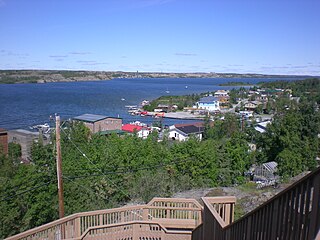
Yellowknife is the capital, largest community, and only city in the Northwest Territories, Canada. It is on the northern shore of Great Slave Lake, about 400 km (250 mi) south of the Arctic Circle, on the west side of Yellowknife Bay near the outlet of the Yellowknife River.
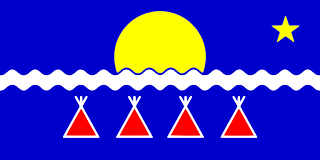
The Tłı̨chǫ people, sometimes spelled Tlicho and also known as the Dogrib, are a Dene First Nations people of the Athabaskan-speaking ethnolinguistic group living in the Northwest Territories of Canada.
Aurora College, formerly Arctic College, is a college located in the Northwest Territories, Canada with campuses in Inuvik, Fort Smith and Yellowknife. They have learning centres in 23 communities in the NWT. The head office for Aurora College is located in Fort Smith.

Norman Wells is a town located in the Sahtu Region, Northwest Territories, Canada. The town, which hosts the Sahtu Regional office, is situated on the north side of the Mackenzie River and provides a view down the valley of the Franklin and Richardson mountains.
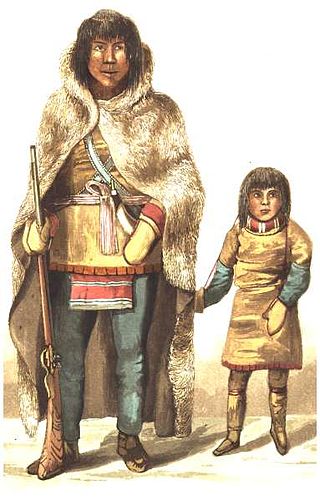
The Yellowknives, Yellow Knives, Copper Indians, Red Knives or T'atsaot'ine are indigenous peoples of Canada, one of the five main groups of the First Nations Dene who live in the Northwest Territories of Canada. The name, which is also the source for the later community of Yellowknife, derives from the colour of the tools made from copper deposits.
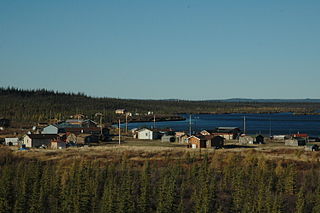
Colville Lake is a settlement corporation located in the Sahtu Region of the Northwest Territories, Canada. The community is located 50 km (31 mi) north of the Arctic Circle, on a lake of the same name, and is northeast of Norman Wells. This settlement is the administrative office of the Behdzi Ahda band government. The community is likely named for Hudson's Bay Company Governor Andrew Colvile.

Łutselkʼe, also spelt Łutsël Kʼé, is a "designated authority" in the North Slave Region of the Northwest Territories, Canada. The community is located on the south shore near the eastern end of Great Slave Lake and until 1 July 1992, it was known as Snowdrift, as the community lies near the mouth of the Snowdrift River.

Gamètì, officially the Tłı̨chǫ Community Government of Gamètì is a community in the North Slave Region of the Northwest Territories, Canada. Gamètì, according to the Prince of Wales Northern Heritage Centre means "rabbit-net lake". 'Gamè' means 'rabbit', and 'tì' means lake, or water. It is one of the four Tłı̨chǫ communities which form part of the Tlicho Government.

Higher education in Canada includes provincial, territorial, indigenous and military higher education systems.

Higher education in the Northwest Territories traces the development and expansion of higher education in Canada's Northwest Territories. In Canada, education is a provincial or territorial concern and there is no national regulation nor accrediting body.
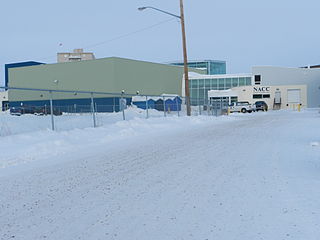
The Northern Arts and Cultural Centre is located in Yellowknife, Northwest Territories, Canada. It is the only performing arts centre in the NWT.

Indigenous education specifically focuses on teaching Indigenous knowledge, models, methods, and content within formal or non-formal educational systems. The growing recognition and use of Indigenous education methods can be a response to the erosion and loss of Indigenous knowledge through the processes of colonialism, globalization, and modernity.

Blachford Lake is a remote lake in Northern Canada, near Yellowknife. The lake is 17 km (11 mi) and sits on precambrian rock. The lake is located at 62 09.97'N, 112 40.96' W and is to the north of the start eastern arm of the Great Slave Lake. It is home of the Dechinta: Centre for Research and Learning, an on-the-land university, co-founded in part by Glen Coulthard, that teaches traditional northern skills.

The South Slave Divisional Education Council (SSDEC) is the organizational entity responsible for the administration of public schools within the South Slave Region of the Northwest Territories, Canada. Its responsibility includes all schools within the five communities of the South Slave. Specifically, it is responsible for schools in the communities of Fort Resolution, Fort Smith, K'atl'odeche First Nation, Hay River, and Łutselk'e. Given the vast distances between communities, and the relatively small populations, the eight schools of the South Slave range in enrolment from 60 to 250 students. Although considered part of the South Slave Region by other departments of the Government of the Northwest Territories, the communities of Fort Providence and Kakisa are served by the Deh Cho Divisional Education Council and not the SSDEC.
Leanne Betasamosake Simpson is a Mississauga Nishnaabeg writer, musician, and academic from Canada.
Onowa McIvor is an Associate Professor and the former Director of Indigenous Education at the University of Victoria. She is also the President of the Foundation for Endangered Languages in Canada.
Three Feathers is a Canadian drama film. The film was written and directed by Carla Ulrich and is based on the novel Three Feathers by Richard Van Camp.
Indigenous cultures in North America engage in storytelling about morality, origin, and education as a form of cultural maintenance, expression, and activism. Falling under the banner of oral tradition, it can take many different forms that serve to teach, remember, and engage Indigenous history and culture. Since the dawn of human history, oral stories have been used to understand the reasons behind human existence. Today, Indigenous storytelling is part of the broader indigenous process of building and transmitting indigenous knowledge.

Glen Sean Coulthard is a Canadian scholar of Indigenous studies who serves as an associate professor in the political science department at the University of British Columbia. A member of the Yellowknives Dene First Nation, he is also a co-founder, educator, and on the board of directors at Dechinta: Centre for Research and Learning. He is best known for his 2014 book, Red Skin, White Masks: Rejecting the Colonial Politics of Recognition, which has been released in both English and French.














